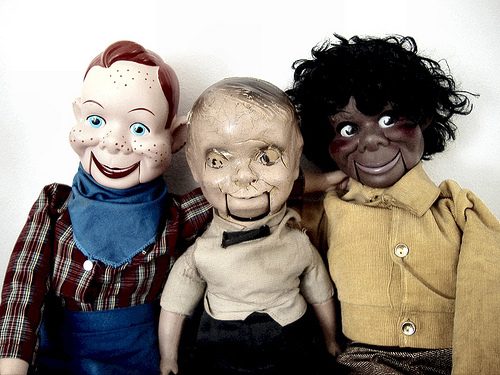Voice and Ventriloquism in Writing

People talk a lot about voice in writing. Voice is that hard-to-describe quality in a piece of writing that is at once internally consistent and capable of generating surprises. It’s not the same as character or personality; it’s a kind of outgrowth of these, maybe the traces they leave on the common material all speakers of a language share. When I talk about what “sounds right” for a character, what I’m really concerned with is how the words they’re using feel together, if they generate the right web of connotations and connections.
I think of good dialogue and good narration as acts of ventriloquism. I speak through the voice that’s right for the job.
One of the things I like best about school visits is seeing kids’ reactions to me. Usually, I’m not what they expect. It’s like they think Marisa is going to walk through the door. This is fine by me—it means that they’re engaging imaginatively with my words to the point where they’ve forgotten that the author isn’t the character. This reaction has been even stronger from people who’ve read a bit from The Knife and the Butterfly. May I please have a dollar for every time I’ve been asked, “You wrote this?”
See what you think of a handful of voices, one from What Can’t Wait and two from The Knife and the Butterfly (out in February of 2012).
Here’s Marisa from What Can’t Wait:
Across the room there’s a girl about my age with her family. They stick out because they’re white in the sea of brown. Whatever their emergency is, I can just tell by how the girl slides her phone open, grins, and starts texting that it’s not exactly hitting her in the gut. Who knows, maybe her brother-in-law just got himself smashed up on the job, too. But her parents are there, the dad in a business suit, the mom in a pretty gray dress, all hushed voices and serious looks. Now the girl is up out of her seat, and her mom gives her a hug and hands her a wad of bills. She slips the money into her jeans pocket, pulls her T-shirt down over her flat tummy, and strolls out of the waiting room. Just like that, so easy.
And here’s Azael from The Knife and the Butterfly:
After Pops got picked up, me and Eddie laid low for a week. When we heard that the CPS people weren’t coming by to look for us anymore, we headed back to the Bel-Lindo.
The Bel-Lindo was bad parents and crackheads, dog shit and dirt for lawns, and pissed-off fools everywhere, but it was still home. There were things I liked, too. Like Jorge Ledesma’s grandma praying the rosary out on the balcony to beat the heat in summer. Or the soccer games with the little guys on the dirt courtyards between buildings. And nowhere else in Houston you could find Mrs. Guzman selling calling cards and Coronas and spicy-as-fuck cheetos right out of her living room window.
Here’s Lexi, also from The Knife and the Butterfly:
Then my mom came into my room talking about responsibility. Blah, blah, blah.
I don’t care if she wants to talk about this shit, but she has to be ready to feel it where it hurts. Like when I remind her that she’s the one who got fired off of three jobs for coming in drunk. She starts to cry, and her mascara globs up in the wrinkles around her eyes. God, she’s pathetic.
I show no mercy, just go in for the kill. I tell her that the mistakes started with her. We’d both be better off if she’d just gotten an abortion. Had me vacuumed out. But she didn’t. So I tell her to stop trying to ruin my life now. Then I grab Theo’s leash and he comes running. A second later we’re out the door and out of her reach.
Read the opening chapter of What Can’t Wait here. Click here for the first bit of The Knife and the Butterfly.




